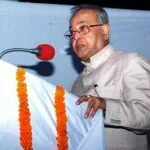 President Pranab Mukherjee Friday asked the youth of the Indian diaspora to learn about India, its traditions and thought process and to use the knowledge for the betterment of the global community at large.
President Pranab Mukherjee Friday asked the youth of the Indian diaspora to learn about India, its traditions and thought process and to use the knowledge for the betterment of the global community at large.
Speaking to a group of Indian youth diaspora attending the ‘Know India Programme’ (KIP) of the ministry of overseas Indian affairs (MOIA) here, Mukherjee said they were fortunate to learn from their Indian ancestors the principle of ‘Vasudhaiva Kutumbakam’ (The world is a family).
Answering questions from participants at Rastrapati Bhavan, the president emphasized the importance of values for the youth and said: “We are fortunate to have learnt from our ancestors the principle of Vasudhaiva Kutumbakam.”
Naming Swami Vivekananda, Rabindranath Tagore and Mahatma Gandhi as contemporary exponents of the ancient philosophy, Mukherjee said the same is enshrined in the Indian constitution, which has been described as a ‘Magna Carta’ for the socio-economic transformation of a large majority of the human race.
Describing the Indian constitution as a living document, which is operationalised every day through statecraft, he pointed out how India has been empowering people through legislations such as the Right to Information, Right to Education and Right to Food, which entrusted a tremendous amount of responsibility on the government.
The president asked the youth attending the 21st edition of KIP to “always keep in mind India’s unity amidst extraordinary diversity, economic goal of inclusive growth and the fact that the key to attaining inclusive growth is spread of knowledge”.
“The story of India is not a few paragraphs in a text book of history, but the story of a vast multitude of human beings trying to find their rightful place in the comity of nations,” he said and noted that this story is enacted everyday in Inida’s villages, agricultural fields, offices, factories, laboratories and classrooms.
Expressing confidence that each of the participants would take home a little part of India in their hearts, he encouraged them to continue learning about India based on their first hand experiences acquired through the KIP.
Commenting on the influence of the western world on India, Mukherjee said India has always been an open society with a continuous flow of cultural influences to and from outside.
India, he said, assimilated the foreign influences and redesigned them to suit its own, unique identity.
“English education and parliamentary system are some of the contributions of the West to India. India added its own traditions of Sabha and Samiti (local bodies of governance) to the democratic system.
The president said every modern nation is a product of assimilation and India has led in civilizational interaction with other parts of the world.
The 21st edition of three-week KIP has participants of Indian origin from 11 countries such as New Zealand, Surinam, Malaysia, Fiji, Sri Lanka, Mauritius, South Africa, Trinidad and Tobago, Iran, Slovak Republic and Israel. All are in the 18-26 age group.
KIP’s objective is to introduce India to the youth of Indian origin living abroad and to link the youth diaspora with their country of origin.
Under the present edition, the participants will visit Tamil Nadu to see and experience historical, cultural, industrial and administrative institutions. They will also interact with the Indian media, visit NGOs and women’s movements.
The first leg of this edition of KIP began on Aug 29 and ended with the participants’ interaction with Mukherjee.
The visitors will visit their host state from Sep 8 to 15 and return to the national capital to share their experiences with the MOIA officials from Sep 16 to 18.(IANS)
 RSS Feed
RSS Feed
